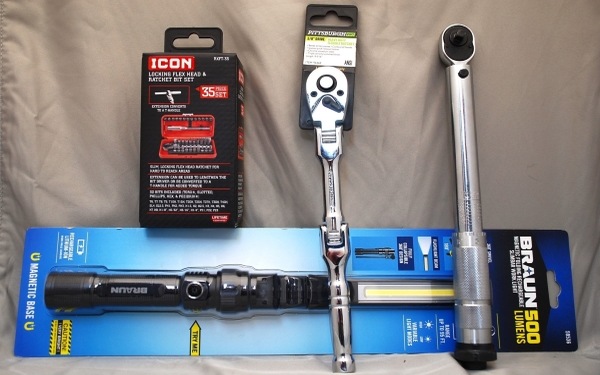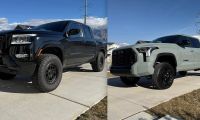Tool Needs for Every Mechanic DIY or Professional
If you work on cars either as a DIY shade tree mechanic or someone who is new to the profession during and after training, there’s no time like the present to get started on building your tool collection.
However, just like you will always want to avoid firing the parts cannon at a repair, you will also want to avoid not only buying the wrong tools (or tools that you don’t really need) but also avoid paying too much for them.
It’s a lot easier than you think it is to overspend if you walk into the tool section of any store or go online shopping without a clear basic plan.
Start with a Basic Tool Plan
A basic tool plan is a realistic assessment of what you plan on working on. Will it be the family car with a focus on just saving money on maintaining it yourself? Will it be an extension of that focus to include repairs as parts break on your vehicle? Or is it all of the above including a project car you’ve always dreamed of rebuilding?
The point to these considerations is that it makes sense to start small and work your way up when it comes to the tools and skills your goals require when it comes to working on cars. It is better to start with a small investment first and tackle typical DIY maintenance tasks until you are sure you want to do more before investing too much too soon on what can become very costly.
A good rule of thumb is to not upgrade a tool until you have outgrown it.
Essential Tools You Have to Have
Here’s a typical list of essential tools a beginning DIY mechanic should consider purchasing:
Socket Set: A comprehensive socket set with various sizes can handle most nuts and bolts you'll encounter. It’s a good idea to go ahead and choose a set that includes SAE with metric.
Wrench Set: Combination wrenches in both metric and standard sizes are essential for turning nuts and bolts. Avoid the pricey ratcheting wrenches for later.
Screwdriver Set: A set with various types and sizes of screwdrivers, including flathead and Phillips, will cover most needs.
Pliers: Long-nose pliers, adjustable jaw pliers both small and plumbing-type large, locking pliers (such as Vise-Grips), and diagonal cutting pliers are versatile and useful.
Adjustable Wrench: Also known as a crescent wrench, this is handy for adjusting nuts and bolts of different sizes. Three sizes: small, medium, and large.
Torque Wrench: Vital for ensuring bolts are tightened to the correct torque specifications, especially for critical components. Caution: It’s easy to spend too much on torque wrenches. Consider your needs for one, such as tightening valve cover bolts versus tightening manifold bolts before buying one. A typical DIY garage can usually get by with a single small mid-level torque wrench for everyday maintenance. However, engine rebuilds require larger and more expensive wrenches.
Jack and Jack Stands: Essential for lifting and supporting your vehicle safely while working underneath. Don’t cheap out on this one; your life is literally at stake here with both jacks and jack stands. If your vehicle came with a simple scissor-style jack―throw it away; they are dangerous. Look for a good hydraulic floor style jack. You can get by with a cheaper bottlenose hydraulic jack but you will soon find them limiting and not as safe to use. Look for well-reviewed jack stands as well that are rated no less than 3 tons (6,000 pounds).
Oil Filter Wrench: Necessary for changing oil filters efficiently. But be sure to get the right type for your car. Some models require different types.
Funnel: Helps to pour fluids cleanly into your vehicle without spillage.
Oil Drain Pan: To catch oil when draining it from your vehicle.
Spark Plug Socket: Specifically designed for removing and installing spark plugs.
Multimeter: Useful for diagnosing electrical issues in your vehicle.
Work Gloves: Protect your hands from cuts, scrapes, and dirt.
Safety Glasses: Essential for protecting your eyes from debris and fluids while working.
Flashlight: Helps illuminate dark areas when working under the hood or beneath the vehicle.
Shop Rags: Useful for wiping down parts and cleaning up spills.
Rubber Mallet: Handy for persuading stubborn parts into place without damaging them.
Breaker Bar: Provides extra leverage for loosening tight bolts and nuts. Get a smaller on with a 3/8-inch socket end and a longer one with a ½ inch socket end.
Wire Brushes: Useful for cleaning rust and corrosion from metal surfaces.
Shop Manual: Specific to your vehicle's make and model, this provides detailed instructions for repairs and maintenance.
Look at What Other Tools Mechanics Use
Another recommendation is to learn from other mechanics on what tools they use and recommend with online reviews that are invaluable. Not only from a quality standpoint, but also from a price perspective as well. You can easily pay 10 times more on a popular brand like Snap-On than a budget brand like Harbor Freight with most tools.
As an example of the kind of YouTube videos to watch, here is a recent Car Wizard episode where the host goes over the 10 tools he believes every mechanic must own:
Ten Must Have Tools Every Mechanic Must Own! I Never Work on Cars Without Them!
Four Harbor Freight Tools Under $40
Pictured below are 4 tools from Harbor Freight that I have found are great additions to a toolbox that can be bought well under $40 each (or better with a coupon or special sale) that often cycle around in their discounts fairly regularly that are useful tools to snag at a lower price.

Related article: Mechanic Responds to Harbor Freight Tool Shaming
#1. Braun 500 Lumen LED Rechargeable Magnetic Handheld Foldable Slim Bar Work Light. Typically sells for $29.99. I’ve bought mine for $19.99 during a coupon sale. It’ a great light for poking around an engine. Be forewarned that the base has a very strong magnetic end that often hides a nut or bolt you could have sworn you just set down a minute ago.
#2. PITTSBURGH PRO 3/8 in. Drive Dual Flex Ratchet. This is an unusual oddball ratchet in that the handle and head are both adjustable to fit in tight and odd configurations. Typically sells for $17.99. I bought mine for $11.99 during a coupon sale.
#3. PITTSBURGH PRO 1/4 in. Drive 20-200 in. lb. Click Torque Wrench. Typically sells for $18.99. I bought mine for $11.99 during a coupon sale. Please note: This is a cheapo torque wrench as torque wrenches go; however, for low torque applications like spark plugs and undercarriage shield bolts it works fine as long as you keep the handle centered while torquing to ensure hearing a small barely audible click when the torque setting is reached.
#4. ICON Locking Flex Head Ratchet and Bit Set, 35-Piece. This is an incredibly useful small bit set for tight spaces under the hood with the coolness factor of a 4 in. extension that can slip into the ratchet head at one end to be used as a T-handle with a socket on the handle end. Typically sells for $39.99. I bought mine for $19.99 during a special sale.
For additional articles related to tools for your garage, here are a few for your consideration:
- The Harbor Freight Tool You Can Do and Buy Better Elsewhere
- Some Cars Require Specialized Tools for DIY Projects
- Toyota Corolla Must-Have Tools for Changing Spark Plugs
Timothy Boyer is an automotive reporter based in Cincinnati. Experienced with early car restorations, he regularly restores older vehicles with engine modifications for improved performance. Follow Tim on “Zen and the Art of DIY Car Repair” website, the Zen Mechanic blog and on Twitter at @TimBoyerWrites and Facebook for daily news and topics related to new and used cars and trucks.
COMING UP NEXT: Used Car License Plate Warning for Shoppers
Image source: Deposit Photos












